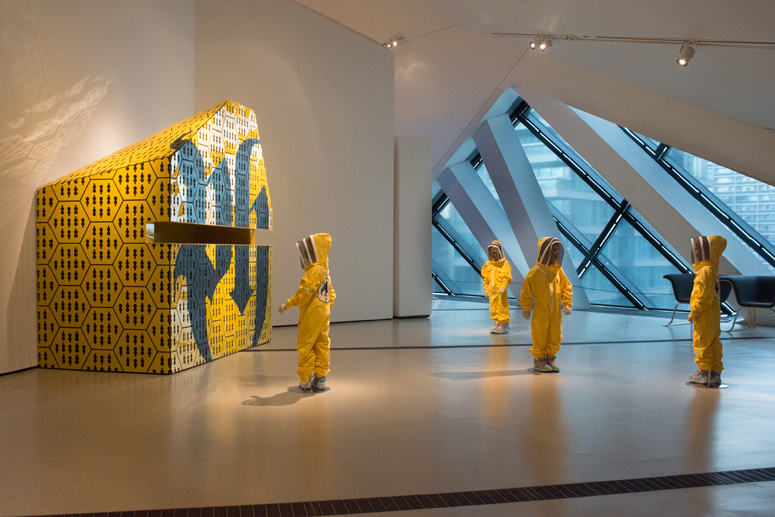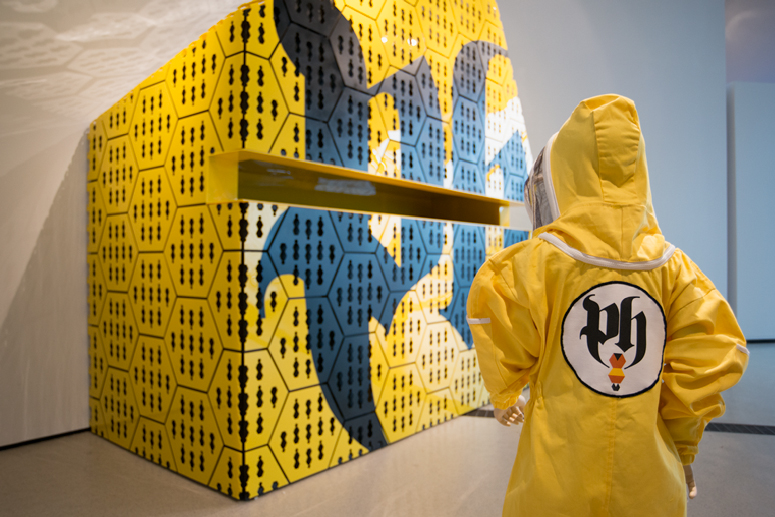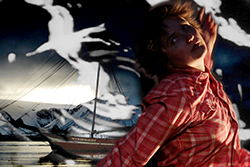Beekeeping for All
Myfanwy MacLeod + Janna Levitt
Mixed Media Installation, 2013
Roloff Beny Gallery, ROM Level 4
In every bee colony, thousands of individuals work in a highly intelligent, co-dependent and hierarchical manner to build hives, and in the act of doing so, provide a fundamental service to all of nature and, almost incidentally, to human survival. Without pollination, there is no agriculture. Without bees transmitting genetic information triggering the creation of new life, new food, new beauty, and growth, we as humans cannot nourish successive generations or ourselves.
In Beekeeping for All, Toronto architect Janna Levitt and Vancouver-based artist Myfanwy MacLeod collaborated in the spirit of agitprop, to present the kiosk as a place for the gathering and sharing of practical information about ways individuals and communities can work together in the common effort to fight Colony Collapse Disorder and climate change. They wish to ignite awareness of these vital issues through ‘ground up’ community involvement and action.
The artists would like to thank Bi-Ying Miao and Matt Compeau of Hot Pop Factory, Lee Meszaros and Julian Gosper.
Myfanwy MacLeod
Myfanwy MacLeod is perhaps best known for her iconic work The Birds, a public sculpture located in Vancouver’s Olympic village. The Birds is an example of her ironic sense of humour and ability to use her work to analyse, even satirize relationships between the individual and larger social structures. Since the 1990s, she has been represented in numerous national and international exhibitions.
Janna Levitt
Janna Levitt is a partner at LGA Architectural Partners and her practice has a particular focus in art and architecture. Current projects she is leading include the new Laurentian School of Architecture of the North in Sudbury for Laurentian University; the central branch of the Kitchener Public Library and the Toronto Media Arts Centre (TMAC). She is also a member of the National Steering Committee for the Canadian Pavilion for the Venice Architecture Biennale.
Where Have All the Honeybees Gone?
Dave Ireland
Managing Director Centre of Discovery in Biodiversity at the ROM
Animals are important pollinators of flowering plants. One third of our food is derived from animal-pollinated crops. The European honeybee (Apis mellifera) native to Europe, Asia, and Africa is the single most important pollinator for human agriculture. It was introduced to North America in the 1600s for this purpose.
Recent declines in honeybee populations across Europe and North America, termed Colony Collapse Disorder, are currently being studied by scientists, including entomologists from the University of Guelph and the Ontario Ministry of Agriculture and Food.
The United States Environmental Protection Agency believes declining bee populations are the result of several causes including, climate change; habitat loss; mites; and pesticides. Parasitic mites can kill bees and research suggests that pesticides can weaken the immune system and make them more susceptible to these parasites.
In the spring of 2012, beekeepers in Canada, USA, and Europe reported a massive loss of bees. Neonicotinoid pesticides are the most widely-used insecticide on the planet, and have been targeted as the primary cause of recent die-offs. The Canadian Pest Management Regulatory Agency is studying neonicotinoid pesticides and the European Union has placed a ban on their use.















